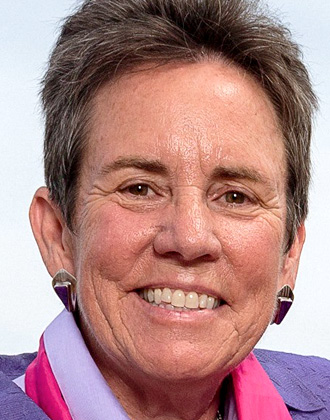Back
1995 MCBA President: Wanden P. Treanor
Nov 01, 2015

In many respects, the MCBA Board in 1995 reflected a change of the guard in that about half of us had been in practice less than 15 years. Marta Osterloh was President-Elect, Terry Mason and Myron Greenberg were officers and Neil Moran was Past President. The directors consisted of: Sandra Bushmaker, Sarah Friesendorf, Rita Gilmore, David Picchi, Michael Samuels, Lorena Chandler, Royda Crosland, Sandra Acevedo, Peter Flaxman, Neil Sorensen, John Boudett, John Grey, Barbara McEntyre, Randy Wallace and Paula Weaver.
In 1995, we had six Superior Court Departments. Gary Thomas, Lynn O’Malley Taylor, Michael Dufficy, William Stephens, Richard Breiner, and Beverly Savitt made up our Superior Court bench. Sylvia Shapiro and Mary Grove were Superior Court Commissioners. It was before the court consolidation, which meant we still had a Municipal Court. The Municipal Court judicial officers consisted of Stephen Graham, Vernon Smith, Lynn Duryee, and Jack Sutro. Randy Heubach and Harvey Goldfine were Municipal Court Commissioners.
The Honorable Beverly Savitt, who was the first woman to serve on the Marin Superior Court bench, retired in 1995. It was also the year that the Honorable Terrence Boren was appointed to the Marin Superior Court.
I started my term as president of MCBA in 1995 when I had been practicing law for ten years. I was very optimistic about the possibilities for a growing bar association and for greater engagement with the larger community of Marin. It was my sense that we were a close-knit group of professionals, respectful of each other and mindful of our civic responsibilities to support Legal Aid, the Family Law Center, and the clients that they serve. In this context, I raised the issue of whether MCBA would take a position on the then-emerging California constitutional amendment known as Prop 209.
Proposition 209 was proposed to amend the state constitution to prohibit state government institutions from considering race, sex, or ethnicity, specifically in the areas of public employment, public contracting or public education. In my February President’s message, I posed the question whether our bar association should weigh in on the matter. I took the position that we should speak out against the amendment. It remains my belief that the bar as a whole benefited by the number of women and people of color who entered our profession as a direct result of affirmative action.
The MCBA Board began the discussion of Prop 209 in February of that year. We pondered the potential for it to be controversial and considered a plebiscite, as outlined in the then-Bylaws of MCBA. However, within days of the February newsletter being delivered, two attorneys, with very different reasons, wrote letters vehemently opposed to MCBA engaging at all in the dialogue about this constitutional amendment. There were three attorneys involved, Robert McCreadie, Ed McGill, and Ron Silveria. Ed and Ron threatened to start the Lawyers Club of Marin. They claimed at least 200 members would secede from MCBA and join the Lawyers Club. Ed and Ron even developed a tag line for the new association “No meetings, No Dues, Cheap Insurance.” Ed wrote an advertisement for it in the Monthly newsletter. At the same time, the California State Bar came out against Prop 209, along with many bar associations throughout California. However, I wasn’t sure that the Marin bar was prepared to take a stand against the initiative. In the end, I did not want to take the risk of having our bar association go on record in support of Prop 209 or having members secede.
After considerable discussion with the Board and with the time to reflect on what would be best for the Marin County Bar Association, I recommended that we not take a position and that we not present it as a vote to the members. Rather, we decided to organize a debate. I invited Ray Marshall, who was the President of the California Bar Association and was representing the State Bar’s position in opposition to the proposition. Mr. Marshall had been speaking around the state at bar associations and community groups in opposition to Prop 209. I asked Ed McGill to present his perspective, presumably in support of the proposition. I also asked the Honorable Henry J. Broderick, Ret. to be the moderator. Judge Broderick was a close friend of my family’s and I knew I could ask him to help in this delicate and potentially highly charged debate. I also knew that he would ensure respect and civility throughout the dialogue. After almost a year of discussion, the debate was held in October as a session of one of the first MCBA MCLE Fairs. It was a great success. I am not aware of anyone seceding from MCBA and we created a forum for a robust exchange of strong and disparate views on a constitutional amendment that continues today. Last year, Randy Wallace forwarded me an email from Ed McGill. He thanked me for how “elegantly and intelligently” he remembered the handling of the issue.
I remained honored and proud to have served as president of MCBA. I continue to appreciate the time and talent that all board members give to the success and sustainability of this vital and important voluntary bar association. Thank you all!
I wish to thank Randy Wallace for his service and hope he had fun as President.

